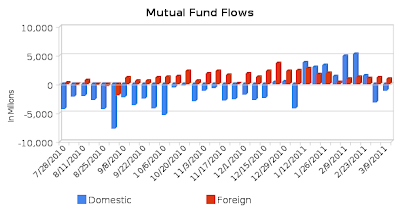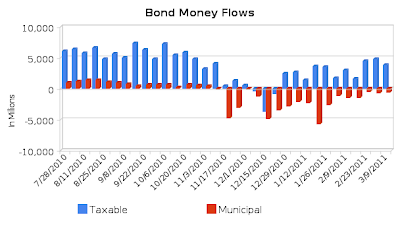This week King World News interviews Bill Fleckenstein, John Hathaway, Gerald Celente and Jim Rickards. Topics cover war in Libya, unrest in the Middle East, QE II/III, what these major events mean to our economy, as well as Gold and Silver's performance.
Bill Fleckenstein - Discusses the fact that the Yen gained in strength against the dollar over the past few weeks brining it under 80 per dollar, the FED then stepped in to strengthen the dollar against the Yen to bring it back above 80. Bill says all fiat currencies are actually in trouble so comparing the dollar vs any fiat currency doesn't make a lot of sense. Bill believes QE2 will stop and will never shrink the balance sheet. If an event occurs to assist, then QE3 will appear. Bill believes their is a whole event coming in housing precipitating housing down further, but their are so many problems currently any of of them is a catalyst to bring the economy down. Bill discusses other very interesting topics including inflation.
John Hathaway - Discusses how we need to see Gold stay above 1440 to be sustained, as well as, take off from here. John thinks if it were to trade this way for a week or so then gold will take off. John says major events like Libya and Japan could be more reasons to continue money printing. John says that gold is still under-owned and the average investor things that gold is where it is at due to Libya, when that is the smaller story. John continues to talk about gold stocks, catalysts for gold and what worries him in the gold market.
Gerald Celente - Discusses the war in Libya and the unrest in the middle east, as well as why the U.S. would go in to assist a country needing it. Gerald also discusses the how the Government wants to balance the budget and we are cutting funding for our people, yet we always have money to fund wars. Gerald brings up a lot of good questions on the economy and the current wars we are in, as well as draws some of his own conclusions as to why we are where we are.
Jim Rickards - Discusses more on his QEII interview and concepts he brought out on permanent on-going QE. Jim re-iterates that the FEDs balance sheet that the rollover of maturity can be used to perform an informal QEIII. This makes it look like QE ended from a political standpoint, but is really going on through debt maturity. In this interview Jim corrects some of his statements on QE and monetization for listeners. He says the point of QE was to keep interest rates low which involves buying enough debt to keep fear in the market to drive interest rates down. Jim regards the Japan event and Libya issue as providing an oil supply shock and demand shock as Japan will have to go to oil and gas to take up for loss in nuclear (putting a floor under oil above 80). Jim says given the debt problems in the world even small shocks can drag us back down. One of the FED officials confirmed Jim's analysis of on-going QE by the FED through debt maturity. Jim also mentions that their is still a chance for QEIII due to world events happening in the past few weeks. Jim goes on to talk about the FEDs toolbox and different things it can do, very interesting analysis.
King World News has a great weekly Metals wrap that is a must listen if you are a metals investor as well. KWN also posts articles on metals, the economy and other interesting topics, so be sure to visit them at http://www.kingworldnews.com























